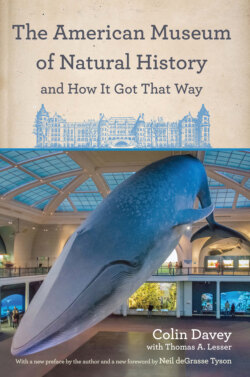The American Museum of Natural History and How It Got That Way

Реклама. ООО «ЛитРес», ИНН: 7719571260.
Оглавление
Colin Davey. The American Museum of Natural History and How It Got That Way
Отрывок из книги
“This is, in many ways, a particularly American story, and anyone interested in history or museums will find this a very satisfying read. Author Colin Davey had a life-long love affair with the museum, growing up in New York and spending many, many hours happily lost in the museum collections, and that shines through in his writing, as does his fine, in-depth research. Plenty of excellent graphics and photographs support this fascinating history.” —Seattle Book Review
“This volume makes a valuable contribution to our knowledge of one of the most iconic American institutions devoted to science and popular education, especially regarding astronomy and space science, over the course of more than a century. Deeply researched and illustrated with 50 black-and-white period photos and numerous diagrams, the work is not only a pleasure to read but will serve as a notable reference for years to come. Planetarians everywhere can benefit from a short to an in-depth perusal of its pages.” —Planetarian: Journal of the International Planetarium Society
.....
Boss Tweed
It quickly became apparent to all parties that to get a law passed by the State Legislature, it would be necessary to secure the support of William Magear Tweed, also known as Boss Tweed, “whose influence was said to be growing so rapidly,” Bickmore wrote in his autobiography, “that it promised soon to become of paramount importance upon the fate of all laws relating to our metropolis.”62 And Choate would later recall: “When it had finally been resolved to establish the American Museum, the first thing was to get a charter from the state, and I went in company with the late William E. Dodge to Albany to consult with members of the Legislature about granting it. To our surprise we found that the matter of granting us a charter depended upon the decision of William M. Tweed, who was then practically in supreme control of the Legislature.”63
.....